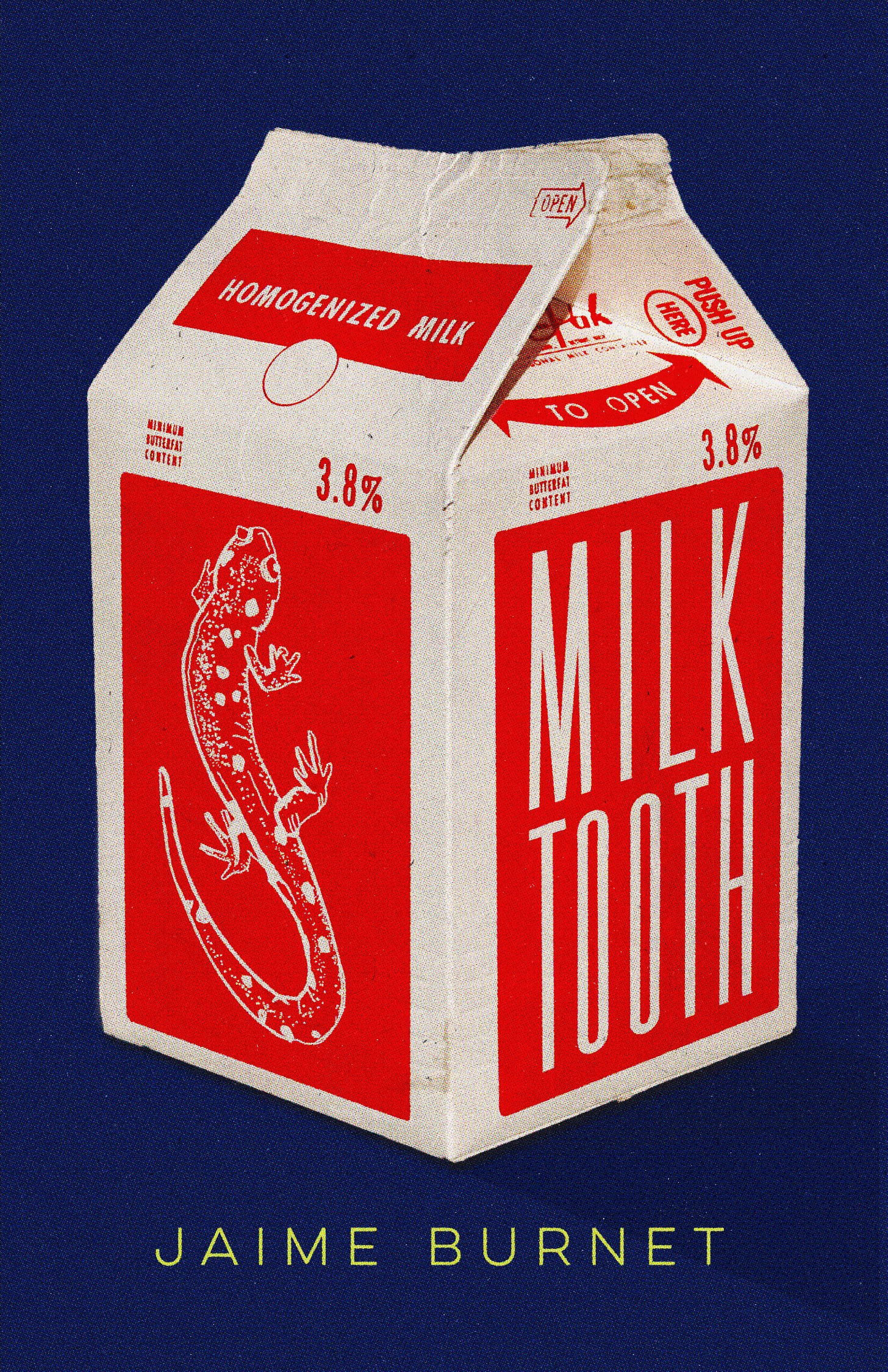Cravings and Gut Feelings in Jaime Burnet’s milktooth
Reviewed by Gina Catherine Grant
Jaime Burnet’s second novel, milktooth, begs you to remember your thirst. The cover art, created by artist Megan Fildes, feels like an opportunity to acknowledge your primary craving: milk. From the obvious, as an infant, unable to express hunger and desire, mouth open wide and wailing. Or, if you were lucky enough to benefit from a school milk program, you remember the squeak of the milk cart rolling into class for your daily calcium, reigniting the debate of white vs. chocolate milk, and struggling with the paper openings that never seemed to split evenly. The cover of milktooth depicts a red and white milk carton over a navy background, with the novel’s title in capital letters and a crawling salamander on the side. The opening looks gummy, as if someone had already enjoyed a drink.
“milktooth explores where our cravings can lead us — toward destruction or fulfillment.”
Milktooth explores where our cravings can lead us — toward destruction or fulfillment. The novel follows Sorcha, who desires to be nurtured as much as she desires to nurture; she yearns to be a mother. The novel begins in the middle; Sorcha has left her beloved job as an environmental researcher, as well as her “pack” of queer chosen family in Halifax to move to Creignish, a small community residing in Inverness County in Cape Breton, with her new partner, Chris. As a resident of Mulipjɨkejk/Herring Cove, Mi’kma'ki/Nova Scotia, Burnet is succinct with her descriptions of Creignish’s landscape and the foreboding nature of the coast.
We are taken through Sorcha’s religious past and estranged family, and of a past abusive relationship. We meet her friends, a diverse and tight knit support system who care deeply for one another. Friends who voice concern over Chris’s love-bombing and the rapid momentum of their relationship.
But Sorcha’s dream of motherhood holds her steadfast to Chris. Although isolated in Creignish, the thought of a baby, a family, gives her hope. And maybe Chris’s insecurities will remain in Halifax, because how can she continue to be so cruel when they are so far from the threat of Sorcha’s closest friends?
Sorcha often gorges on her forbidden fruit: whole milk, an item incompatible with Chris’s enforced vegan lifestyle. Dairy is Sorcha’s “secret rebellion” against Chris’s increasingly disturbing acts of emotional abuse. She leans on the homogenized drink, relishing in “the thickness and weight of it and the shock of so much liquid filling my stomach (. . .) like dropping an anchor to hold me in place.” She searches for additional anchors, including submersing herself in the frigid November ocean to survive Chris’s culling of her roots, and her sense of self.
Sorcha holds onto the idea of a weekend away in Halifax. One that can only happen with Chris at the wheel, as she forbids Sorcha to drive, yet another stoplight to Sorcha’s freedom. Sorcha absorbs herself in her friend Dana’s social media feeds; Dana is a new mother, and her timeline of baby photos increases Sorcha’s hunger for motherhood like a high tide, as if Dana’s “baby pulls on my womb like the moon.”
While plans to travel to a fertility clinic in Toronto take shape, Sorcha’s responses to Chris’s cruelty begin to stir something in the survival mode she’s been inhabiting. She debates if being a mother is worth being with Chris. She goes so far as to wonder if her future baby will avoid Chris’s wrath; Chris is kind to her beloved cat, Della, but will their baby be so lucky?
As the reader, you urge Sorcha to turn back, call her friends, or seek help from one of the Creignish locals. When Sorcha realizes she’s pregnant, she finds solace and refuge in a reunion with her estranged Scotland-based aunt Agnes, a biological connection that may shed light on their shared Christian family, and shelter from Chris.
Burnet explores the complexity of queer domestic abuse in milktooth with empathy; her compassion no doubt stemming from her work as a practicing labour and human rights lawyer. But she certainly does not lack in wit and humour. Burnet imagines Sorcha’s brain as an office space equipped with workers, overflowing file folders and memos for her to compartmentalize the events taking place. Think Inside Out for the millennial queer person, but instead of animated personified emotions trying to employ self-regulation, they’re trying to tell her the truth. But how do you acknowledge the truth when the beginning is unidentifiable, maybe it was this fight, or that argument? Maybe Sorcha cries too fast, too easily? Sorcha's relationship is like “walking in a neighbourhood you think you know, and then after a while you’re lost but you can’t remember where you took a wrong turn.”
Milktooth seeks growth and regeneration, not unlike Sorcha’s favourite animal, the salamander, an amphibian admired for its regenerative capacities, limbs and vital organs alike. Milktooth reveals the paths we can take, but not without sacrifice. Not without the decision to cut what is rotted, what is spoiled, for what is new and nurturing.
About the Author
Jaime Burnet lives with her family in Mulipjɨkejk/Herring Cove, Mi’kma’ki/Nova Scotia, where she writes, makes music, and walks by the ocean. She practices labour, employment, and human rights law in Kjipuktuk/Halifax.
About the Reviewer
Gina Catherine Grant is a writer and former professional contemporary dancer. She lives in Menahquesk/Saint John, NB where she works as a librarian assistant. Her writing has appeared in Billie: Visual - Culture - Atlantic, It’s Burning Off and Soliloquies Anthology.
Book Details
Publisher : Vagrant Press
Publication date : May 6 2025
Language : English
Print length : 280 pages
ISBN-10 : 1774713640
ISBN-13 : 978-1774713648





